新概念2册 lesson4 知识点全讲解
新概念2册lesson4知识点全讲解
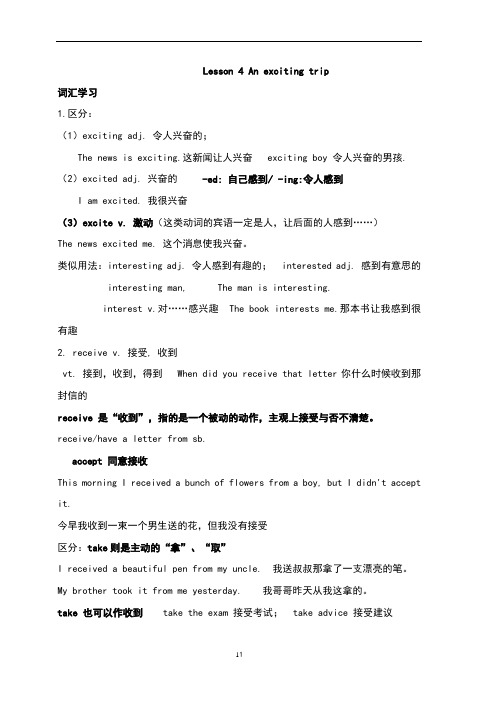
Lesson 4 An exciting trip词汇学习1.区分:(1)exciting adj. 令人兴奋的;The news is exciting.这新闻让人兴奋 exciting boy 令人兴奋的男孩.(2)excited adj. 兴奋的-ed: 自己感到/ -ing:令人感到I am excited. 我很兴奋(3)excite v. 激动(这类动词的宾语一定是人,让后面的人感到……)The news excited me. 这个消息使我兴奋。
类似用法:interesting adj. 令人感到有趣的; interested adj. 感到有意思的interesting man, The man is interesting.interest v.对……感兴趣 The book interests me.那本书让我感到很有趣2. receive v. 接受, 收到vt. 接到,收到,得到 When did you receive that letter你什么时候收到那封信的receive 是“收到”,指的是一个被动的动作,主观上接受与否不清楚。
receive/have a letter from sb.accept 同意接收This morning I received a bunch of flowers from a boy, but I didn't accept it.今早我收到一束一个男生送的花,但我没有接受区分:take则是主动的“拿”、“取”I received a beautiful pen from my uncle. 我送叔叔那拿了一支漂亮的笔。
My brother took it from me yesterday. 我哥哥昨天从我这拿的。
take 也可以作收到 take the exam 接受考试; take advice 接受建议(1)n. 商行, 公司 law firm法律公司(2)adj 结实的,稳固的The car is very firm.区分firm中小型公司;company n. 正规公司;business商行great number of +可数名词复数 = a great many +可数名词复数a great number of cars, a great many people区分:a great amount of +不可数名词a great amount of moneyadj. 不同的① adj. 不同的,相异的(经常与from连用)We are planning something different this year. 我们今年有不同的打算。
新概念英语第2册单词Lesson4:An exciting trip

新概念英语第2册单词Lesson4:An exciting trip exciting [k'satng] adj.令人兴奋的
【单词扩充】excited激动的
【单词搭配】exciting news令人激动的消息
【单词例句】
A:Our team won the match last night.
A:我们队赢下了昨天那场比赛。
B:That's exciting news.
B:这真是个令人兴奋的消息。
receive [r'siv] 接受,收到
firm [fm] 商行,公司
different ['df()r()nt] adj.不同的
【单词扩充】diverse不同的
【单词搭配】be different from 与……不同
【单词例句】
A:I'm almost sure that information was filed.
A:我几乎能够肯定,那份资料已经存档。
B:Would you like me to check again under a different heading? B:让我在别的标题下再查一查,好吗?
centre ['sent]n. 中心的
【单词扩充】 middle中间
【单词搭配】in the centre of在……中心
【单词例句】
A:I don't know how to use it.
A:我不知道它怎么用。
B:You can make a phone call to the centre for users. B:你能够给用户中心打电话。
abroad ['brd] adv. 在国外。
新概念英语第二册笔记:Lesson 4 An Exciting trip
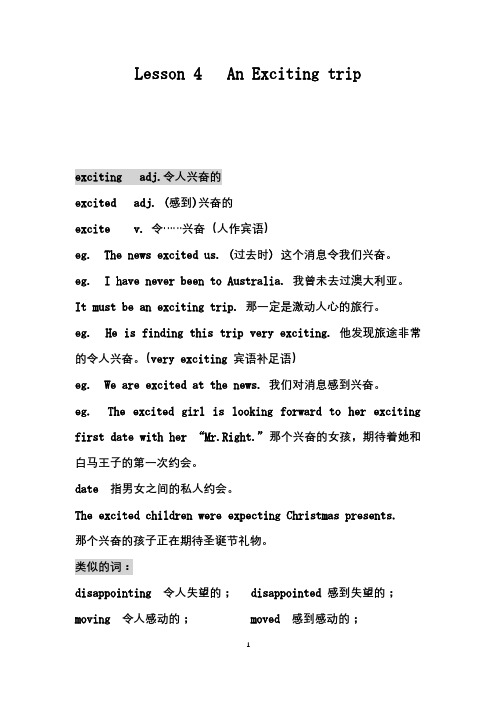
Lesson 4 An Exciting tripexciting adj.令人兴奋的excited adj. (感到)兴奋的excite v. 令……兴奋(人作宾语)eg. The news excited us. (过去时) 这个消息令我们兴奋。
eg. I have never been to Australia. 我曾未去过澳大利亚。
It must be an exciting trip. 那一定是激动人心的旅行。
eg. He is finding this trip very exciting. 他发现旅途非常的令人兴奋。
(very exciting 宾语补足语)eg. We are excited at the news. 我们对消息感到兴奋。
eg. The excited girl is looking forward to her exciting first date with her “Mr.Right.”那个兴奋的女孩,期待着她和白马王子的第一次约会。
date 指男女之间的私人约会。
The excited children were expecting Christmas presents.那个兴奋的孩子正在期待圣诞节礼物。
类似的词:disappointing 令人失望的; disappointed 感到失望的;moving 令人感动的; moved 感到感动的;touching 令人感动的; touched 感到感动的;embarrassing 令人尴尬的; embrassed 感到尴尬的;surprising 令人惊讶的; surprised 感到惊讶的;shocking 令人震惊的; shocked 感到震惊的;satisfying 令人满意的; satisfied 感到满意的;receive v. 收到reeive sth from sb. 从……收到……;receive a letter 收到一封信;receive a present 收到一份礼物;receive a phone call 接到一个电话;receive good education 受到良好的教育;eg. You will receive a warm welcome whenever you come to my home. 无论你们什么时候来我们家,你都将受到热烈欢迎。
新概念英语2册4课Lesson4(详解)
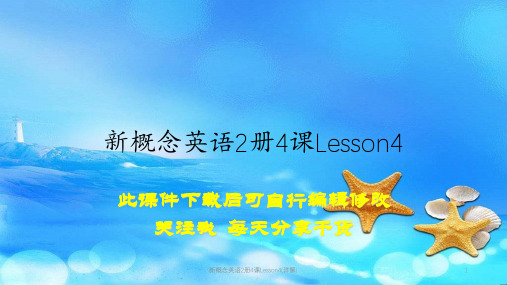
__d_e_ci_sioI ndid not write ae_a_rl_y____ card!bought
spent
whole
but
single 新概念英语2册4课Lesson4(详解)
4
New words
exciting adj. 令人兴奋的(修饰事物)
excited 感到兴奋的(修饰人)
-ed自己感到 interested, bored, relaxed -ing令人感到interesting,boring,relaxing
新概念英语2册4课Lesson4(详解)
10
New Lesson
An exciting trip
I have just received a letter from my brother,
Tim. He is in Australia. He has been there for
six months. Tim is an engineer. He is working
同义 accept同意,接受(主观)
e.g. This morning I received a bunch of
flowers but I didn’t accept it. take接受,收到
e.g. take the exam, take advice
新概念英语2册4课Lesson4(详解)
6
新概念英语2册4课Lesson4
此课件下载后可自行编辑修改 关注我 每天分享干货
新概念英语2册4课Lesson4(详解)
1
key points
I.Key words exciting, receive, firm, different…
新概念英语第二册语法精讲-Lesson4
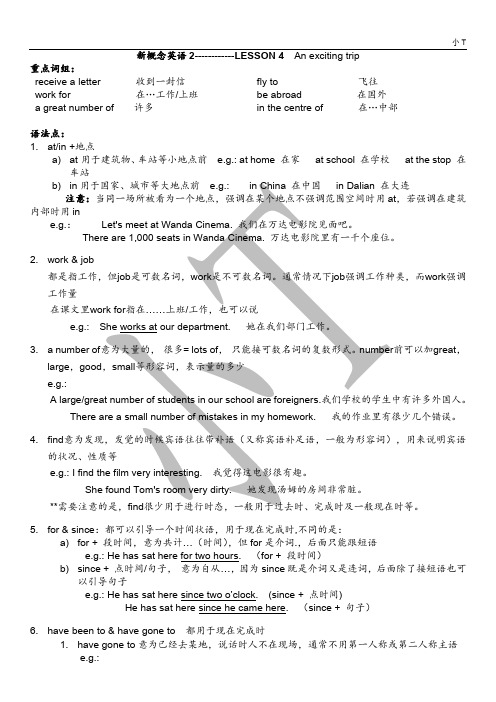
小T 新概念英语2------------LESSON 4 An exciting trip重点词组:receive a letter 收到一封信work for 在…工作/上班a great number of 许多fly to 飞往be abroad 在国外in the centre of 在…中部语法点:1. at/in +地点a) at用于建筑物、车站等小地点前 e.g.: at home 在家at school 在学校at the stop 在车站b) in用于国家、城市等大地点前 e.g.: in China 在中国in Dalian 在大连注意:当同一场所被看为一个地点,强调在某个地点不强调范围空间时用at,若强调在建筑内部时用ine.g.:Let's meet at Wanda Cinema. 我们在万达电影院见面吧。
There are 1,000 seats in Wanda Cinema. 万达电影院里有一千个座位。
2. work & job都是指工作,但job是可数名词,work是不可数名词。
通常情况下job强调工作种类,而work强调工作量在课文里work for指在……上班/工作,也可以说e.g.: She works at our department. 她在我们部门工作。
3. a number of意为大量的,很多= lots of,只能接可数名词的复数形式。
number前可以加great,large,good,small等形容词,表示量的多少e.g.:A large/great number of students in our school are foreigners.我们学校的学生中有许多外国人。
There are a small number of mistakes in my homework. 我的作业里有很少几个错误。
4. find意为发现,发觉的时候宾语往往带补语(又称宾语补足语,一般为形容词),用来说明宾语的状况、性质等e.g.: I find the film very interesting. 我觉得这电影很有趣。
新概念英语第二册复习笔记 第四课 课文讲解

新概念英语第二册复习笔记第四课课文讲解just 搭配现在完成时receive a letter from sb 相当于hear from sb 收到……来信write to sb 给…..写信Australia n.澳大利亚Australian adj. 澳大利亚的Italy n. 意大利Italian n. 意大利语for six monthsHe went there six months ago. 半年前他去那儿了。
He has been there since six months ago. 自从半年前他就去哪儿了。
He has been there for six months. 他已经在哪儿半年了。
for + 一段时间since + 时间的一点engineer n. 工程师,建筑师,机械师,火车司机engine n. 发动机;引擎,机车,火车头a steam engine 蒸汽机车engine-driver (Br) 火车司机engineer (U.S) 火车司机a number of + n.( pl.) + are……许多的,大量的eg. A large number of books are stolen. 大量的书籍被盗。
The number of + n.( pl.) + is….. ……的数量是eg. The number of stolen books is 25. 被偷的书的数目是25本。
eg. A number of people apply for this job. 许多人申请这份工作。
eg. The number of applicants is 70. 申请者的数目是70人。
number n. 号码,数字,数目eg. My telephone number is 6229897. 我的电话号码是6229897.No. ( short term 缩略形式)eg. The company is No. One in the oil business. 这家公司在石油领域是最棒的。
新概念英语第二册 lesson 4 笔记和答案
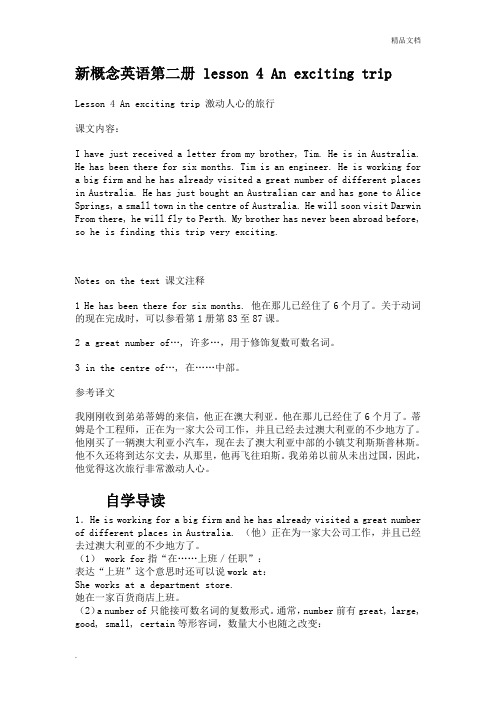
新概念英语第二册 lesson 4 An exciting trip Lesson 4 An exciting trip 激动人心的旅行课文内容:I have just received a letter from my brother, Tim. He is in Australia. He has been there for six months. Tim is an engineer. He is working for a big firm and he has already visited a great number of different places in Australia. He has just bought an Australian car and has gone to Alice Springs, a small town in the centre of Australia. He will soon visit Darwin From there, he will fly to Perth. My brother has never been abroad before, so he is finding this trip very exciting.Notes on the text 课文注释1 He has been there for six months. 他在那儿已经住了6个月了。
关于动词的现在完成时,可以参看第1册第83至87课。
2 a great number of…, 许多…,用于修饰复数可数名词。
3 in the centre of…, 在……中部。
参考译文我刚刚收到弟弟蒂姆的来信,他正在澳大利亚。
他在那儿已经住了6个月了。
蒂姆是个工程师,正在为一家大公司工作,并且已经去过澳大利亚的不少地方了。
他刚买了一辆澳大利亚小汽车,现在去了澳大利亚中部的小镇艾利斯斯普林斯。
新概念2册 lesson4 知识点全讲解
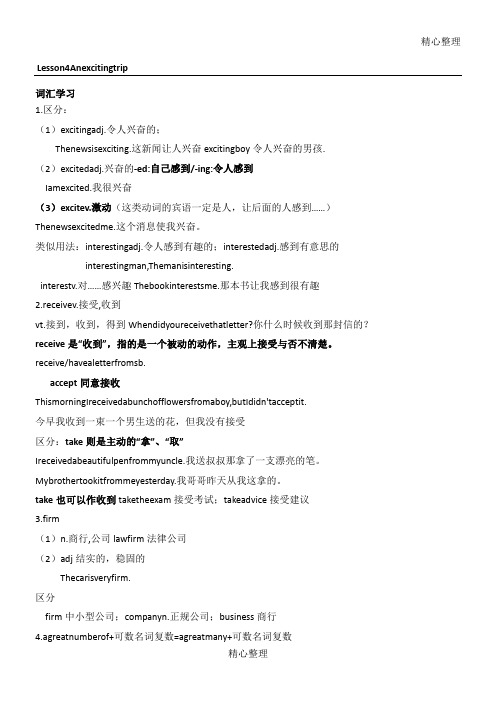
精心整理Lesson4Anexcitingtrip词汇学习1.区分:(1)excitingadj.令人兴奋的;Thenewsisexciting.这新闻让人兴奋excitingboy令人兴奋的男孩.(2)excitedadj.兴奋的-ed:自己感到/-ing:令人感到Iamexcited.我很兴奋(3)excitev.激动(这类动词的宾语一定是人,让后面的人感到……)Thenewsexcitedme.这个消息使我兴奋。
类似用法:interestingadj.令人感到有趣的;interestedadj.感到有意思的interestingman,Themanisinteresting.interestv.对……感兴趣Thebookinterestsme.那本书让我感到很有趣2.receivev.接受,收到vt.接到,收到,得到Whendidyoureceivethatletter?你什么时候收到那封信的?receive是“收到”,指的是一个被动的动作,主观上接受与否不清楚。
receive/havealetterfromsb.accept同意接收ThismorningIreceivedabunchofflowersfromaboy,butIdidn'tacceptit.今早我收到一束一个男生送的花,但我没有接受区分:take则是主动的“拿”、“取”Ireceivedabeautifulpenfrommyuncle.我送叔叔那拿了一支漂亮的笔。
Mybrothertookitfrommeyesterday.我哥哥昨天从我这拿的。
take也可以作收到taketheexam接受考试;takeadvice接受建议3.firm(1)n.商行,公司lawfirm法律公司(2)adj结实的,稳固的Thecarisveryfirm.区分firm中小型公司;companyn.正规公司;business商行4.agreatnumberof+可数名词复数=agreatmany+可数名词复数agreatnumberofcars,agreatmanypeople区分:agreatamountof+不可数名词agreatamountofmoney5.differentadj.不同的①adj.不同的,相异的(经常与from连用)Weareplanningsomethingdifferentthisyear.我们今年有不同的打算。
裕兴 新概念英语 第二册 Lesson 4 第4课 笔记讲义
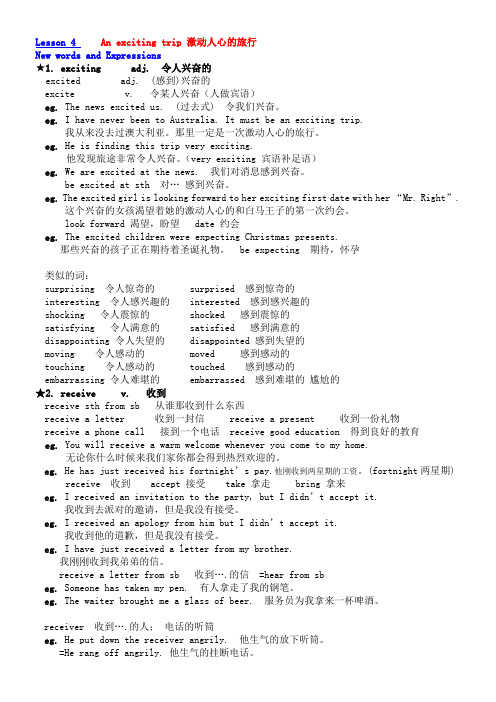
Lesson 4 An exciting trip 激动人心的旅行New words and Expressions★1. exciting adj. 令人兴奋的excited adj. (感到)兴奋的excite v. 令某人兴奋(人做宾语)eg. The news excited us. (过去式) 令我们兴奋。
eg. I have never been to Australia. It must be an exciting trip.我从来没去过澳大利亚。
那里一定是一次激动人心的旅行。
eg. He is finding this trip very exciting.他发现旅途非常令人兴奋。
(very exciting 宾语补足语)eg. We are excited at the news. 我们对消息感到兴奋。
be excited at sth 对…感到兴奋。
eg.The excited girl is looking forward to her exciting first date with her “Mr. Right”.这个兴奋的女孩渴望着她的激动人心的和白马王子的第一次约会。
look forward 渴望,盼望 date 约会eg. The excited children were expecting Christmas presents.那些兴奋的孩子正在期待着圣诞礼物。
be expecting 期待,怀孕类似的词:surprising 令人惊奇的 surprised 感到惊奇的interesting 令人感兴趣的 interested 感到感兴趣的shocking 令人震惊的 shocked 感到震惊的satisfying 令人满意的 satisfied 感到满意的disappointing 令人失望的 disappointed 感到失望的moving 令人感动的 moved 感到感动的touching 令人感动的 touched 感到感动的embarrassing 令人难堪的 embarrassed 感到难堪的尴尬的★2. receive v. 收到receive sth from sb 从谁那收到什么东西receive a letter 收到一封信 receive a present 收到一份礼物receive a phone call 接到一个电话 receive good education 得到良好的教育eg. You will receive a warm welcome whenever you come to my home.无论你什么时候来我们家你都会得到热烈欢迎的。
新概念英语第二册Lesson4(共49张PPT)
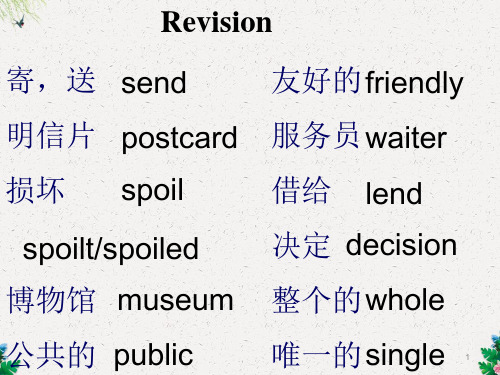
He lived abroad for many years. 你出国度假吗?
9
■different adj.不同的—— same相同的
(1)不同的,相异的(经常与from连用): be different from...与…不同 Desks are different from tables.
My plan/idea is different from yours.
We are planning something different this year. (2)各种各样的,不同的:
He has visited many different places in China. 他去过中国的不少地方。
This department store sells a large number of different things.
这家百货商店出售许多各种各样的东西。
adv. differently, n. difference
3
【辨】 exciting, thrilling ['θrɪlɪŋ] exciting 通常来形容让人很激动的人或事; thrilling 用来形容让人激动或害怕的发抖、令
人难以控制情绪的事
-ed自己感到 interested, bored, -ing令人感到interesting,boring, I am interested in this book. This is an interesting book.
Revision
寄,送 send 明信片 postcard 损坏 spoil
spoilt/spoiled 博物馆 museum
新概念英语第二册第四课最全讲义

An exciting trip激动人心的旅行【NEW WORDS AND EXPRESSIONS】生词和短语★exciting a.令人兴奋的, 使人激动的This news is very exciting .excited a.(自己)感到兴奋的, 令人感到兴奋的We are very excited about this news.interesting 有趣的interesting novel interested (人对物)兴趣的surprising adj.令人惊讶的surprised adj.(人)感到惊讶的其宾语一定是人The news excited me.让后面的人感到...The book interests me.★receive v. 接受,收到receive a letter from sb. =hear from sb. 收到~~的来信accept:同意接收receive:客观的收到This morning I received a bunch of flowers from a boy, but I didn't accept it. take take the exam:接收考试;take advice接收建议receive/have receive / have a letter from somebody.★firm n. 商行,公司company★different adj. 不同的be different from/to…与…不同My plan/idea is different from yours.★centre n. 中心★abroad adv. 在国外, 在海外的,在国外的(一般作表语)同义词overseas 向海外,在海外,在国外副词,直接和动词连用Go/ live/ travel/ study abroadAlice Springs Darwin PerthQuestions on the text☐How long has Tim been in Australia?☐What does he do in Australia?☐Why is Tim finding the trip exciting?I have just received a letter from my brother, Tim. He is in Australia. He has been there for six months. Tim is an engineer. He is working for a big firm and he has already visited a great number of different places in Australia. He has just bought an Australian car and has gone to Alice Springs, a small town in the centre of Australia. He will soon visit Darwin. From there, he will fly to Perth. My brother has never been abroad before, so he is finding this trip very exciting.参考译文我刚刚收到弟弟蒂姆的来信,他正在澳大利亚。
新概念2册 lesson4 知识点全讲解
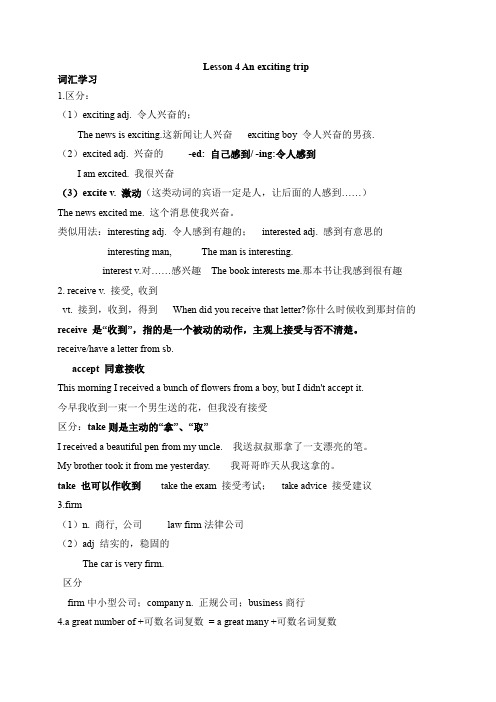
Lesson 4 An exciting trip词汇学习1.区分:(1)exciting adj. 令人兴奋的;The news is exciting.这新闻让人兴奋exciting boy 令人兴奋的男孩.(2)excited adj. 兴奋的-ed: 自己感到/ -ing:令人感到I am excited. 我很兴奋(3)excite v. 激动(这类动词的宾语一定是人,让后面的人感到……)The news excited me. 这个消息使我兴奋。
类似用法:interesting adj. 令人感到有趣的;interested adj. 感到有意思的interesting man, The man is interesting.interest v.对……感兴趣The book interests me.那本书让我感到很有趣2. receive v. 接受, 收到vt. 接到,收到,得到When did you receive that letter?你什么时候收到那封信的receive 是“收到”,指的是一个被动的动作,主观上接受与否不清楚。
receive/have a letter from sb.accept 同意接收This morning I received a bunch of flowers from a boy, but I didn't accept it.今早我收到一束一个男生送的花,但我没有接受区分:take则是主动的“拿”、“取”I received a beautiful pen from my uncle. 我送叔叔那拿了一支漂亮的笔。
My brother took it from me yesterday. 我哥哥昨天从我这拿的。
take 也可以作收到take the exam 接受考试;take advice 接受建议3.firm(1)n. 商行, 公司law firm法律公司(2)adj 结实的,稳固的The car is very firm.区分firm中小型公司;company n. 正规公司;business商行4.a great number of +可数名词复数= a great many +可数名词复数a great number of cars, a great many people区分:a great amount of +不可数名词a great amount of money5.different adj. 不同的① adj. 不同的,相异的(经常与from连用)We are planning something different this year. 我们今年有不同的打算。
新概念第二册 第4-6课 知识点总结整理
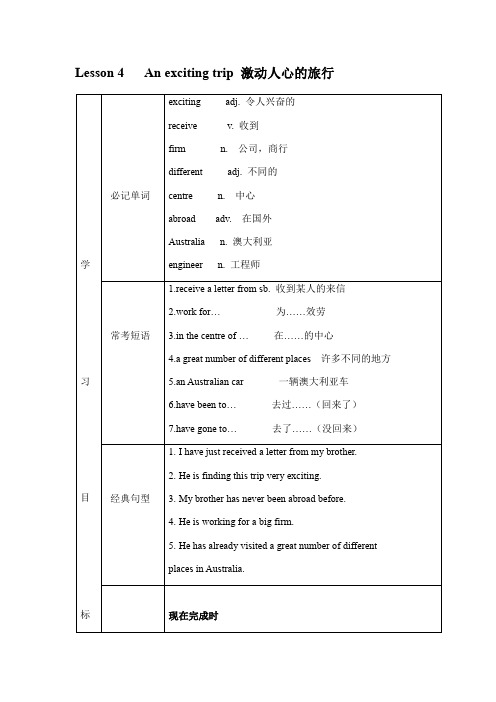
5.My brother hasneverbeen abroadbefore, so he is finding thistrip veryexciting.我弟弟以前从未出过国,因此,他觉得这次旅行非常激动人心。
常考短语
1.receive a letter from sb.收到某人的来信
2.work for…为……效劳
3.in the centre of …在……的中心
4.a great number of different places许多不同的地方
5.an Australian car一辆澳大利亚车
6.have been to…去过……(回来了)
例:I haven't seen much of himrecently (lately).
我已经很久没有看到他(最近的)。
We have seen that filmbefore.
我们以前已经看过那部电影了。
Have they found the missing childyet?
他们找到失踪的孩子了吗?
= hear from sb.
拓展:receivev.接受,收到(客观) / accept:同意接收(主观)
例:This morning I received a bunch of flowers from a boy, but I didn't accept it.今天早上我收到一束小男孩的花,但是我没接受。
distance n.距离
request n.要求,请求
spare part n.备件
service n.服务
[全]新概念英语第2册4课
![[全]新概念英语第2册4课](https://img.taocdn.com/s3/m/2750f1de650e52ea551898d5.png)
新概念英语第2册4课Lesson 41.exciting [ik'saitiŋ] a.令人兴奋的2.receive [ri'si:v] v.接受,收到3.firm [fə:m] n.商行,公司4.different ['difrənt] a.不同的5.centre ['sentə] n.中心6.abroad [ə'brɔ:d] ad.在国外1. exciting [ik'saitiŋ] a.令人兴奋的,令人激动的,使人激动的,激动人心的;使人激动的;刺激的①This is an exciting film.这是一部扣人心弦的电影。
②You're going to Africa? How exciting!你要去非洲?真是太刺激了!③It was a really exciting match.这的确是一场扣人心弦的比赛。
④The children are very excited to hear the exciting news.听到那个令人兴奋的消息,孩子们很兴奋。
(注意这两个单词的区别)⑤The only exciting occurrence was the unexpected drizzle. It had drenched my clothes.唯一让人兴奋的事情就是一场细雨不期而降,它淋湿了我的衣服。
⑥It's always exciting to see polar bears in nature. I will never tire of it as they are fascinating creatures. It is always special. 在自然的环境里看到北极熊是令人兴奋地。
我永远不会厌倦他们,他们太有趣也太特别了。
⑦Experts said the find was exciting and like looking into a "lost world" .今朝重见天日,专家惊呼犹如发现迷失的世界。
(完整版)新概念英语第二册lesson-4(含课文、练习)
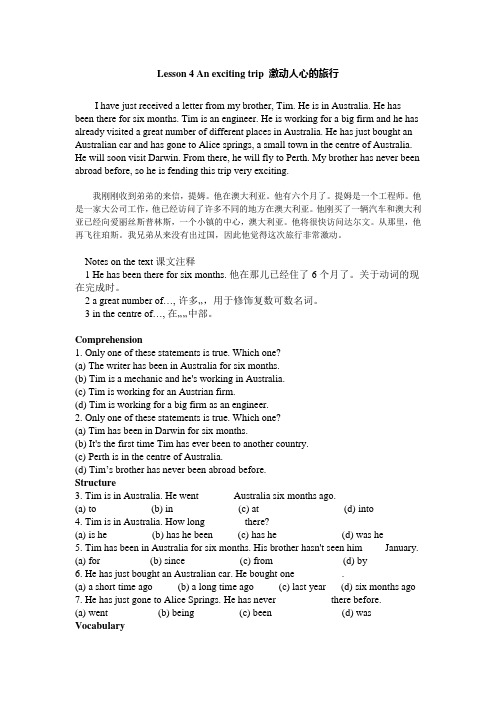
Lesson 4 An exciting trip 激动人心的旅行I have just received a letter from my brother, Tim. He is in Australia. He has been there for six months. Tim is an engineer. He is working for a big firm and he has already visited a great number of different places in Australia. He has just bought an Australian car and has gone to Alice springs, a small town in the centre of Australia. He will soon visit Darwin. From there, he will fly to Perth. My brother has never been abroad before, so he is fending this trip very exciting.我刚刚收到弟弟的来信,提姆。
他在澳大利亚。
他有六个月了。
提姆是一个工程师。
他是一家大公司工作,他已经访问了许多不同的地方在澳大利亚。
他刚买了一辆汽车和澳大利亚已经向爱丽丝斯普林斯,一个小镇的中心,澳大利亚。
他将很快访问达尔文。
从那里,他再飞往珀斯。
我兄弟从来没有出过国,因此他觉得这次旅行非常激动。
Notes on the text 课文注释1 He has been there for six months. 他在那儿已经住了6个月了。
关于动词的现在完成时。
2 a great number of…, 许多…,用于修饰复数可数名词。
3 in the centre of…, 在……中部。
新概念英语第二册lesson-4(含课文、练习)

新概念英语第二册lesson-4(含课文、练习)Lesson 4 XXX激动人心的旅行XXX there for six months。
Tim is an engineer。
He is working for a big XXX car and has gone to Alice springs。
a small town in the XXX。
From there。
he will fly to Perth。
My brother has never beenabroad before。
so he is XXX.我方才收到弟弟的来信,XXX。
他在澳大利亚。
他有六个月了。
XXX是一个工程师。
他是一家大公司事情,他曾经拜候了很多分歧的中央在澳大利亚。
他刚买了一辆汽车和澳大利亚曾经向XXX,一个小镇的中央,澳大利亚。
他将很快拜候XXX。
从那边,他再飞往珀斯。
我兄弟历来没有出过国,因而他感觉此次游览十分冲动。
XXX课文解释1 He has been there for six months.他在那儿曾经住了6个月了。
关于动词的目前完成时。
2 a great number of…,很多…,用于润饰复数可数名词。
3 XXX…,在……中部。
n1.Only one of these statements is true。
Which one?a) XXX.b) XXX.c) Tim is working for an Austrian firm.d) Tim is working for a big firm as an engineer.2.Only one of these statements is true。
Which one?a) Tim has been in Darwin for six months.b) It's the first time Tim has ever been to another country.c) XXX XXX Australia.d) Tim’s brother has never been abroad before.Structure3.Tim XXX ______ Australia six months ago.a) to(b) in(c) at(d) XXX _______ there?a) is he(b) has he been(c) has he(d) was he5.Tim has been in Australia for six months。
新概念二Lesson 4 An Exciting Trip最全知识点总结
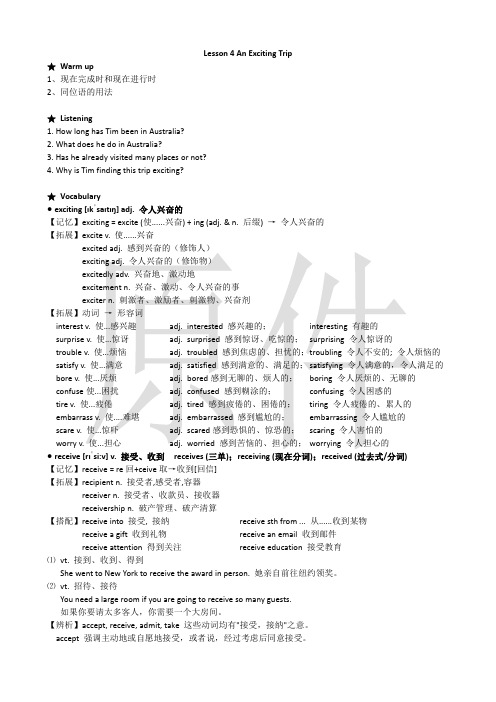
Lesson4An Exciting Trip★Warm up1、现在完成时和现在进行时2、同位语的用法★Listening1.How long has Tim been in Australia?2.What does he do in Australia?3.Has he already visited many places or not?4.Why is Tim finding this trip exciting?★Vocabulary●exciting[ɪkˈsaɪtɪŋ]adj.令人兴奋的【记忆】exciting=excite(使......兴奋)+ing(adj.&n.后缀)→令人兴奋的【拓展】excite v.使......兴奋excited adj.感到兴奋的(修饰人)exciting adj.令人兴奋的(修饰物)excitedly adv.兴奋地、激动地excitement n.兴奋、激动、令人兴奋的事exciter n.刺激者、激励者、刺激物、兴奋剂【拓展】动词→形容词interest v.使...感兴趣adj.interested感兴趣的;interesting有趣的surprise v.使...惊讶adj.surprised感到惊讶、吃惊的;surprising令人惊讶的trouble v.使...烦恼adj.troubled感到焦虑的、担忧的;troubling令人不安的;令人烦恼的satisfy v.使...满意adj.satisfied感到满意的、满足的;satisfying令人满意的,令人满足的bore v.使...厌烦adj.bored感到无聊的、烦人的;boring令人厌烦的、无聊的confuse使...困扰adj.confused感到糊涂的;confusing令人困惑的tire v.使...疲倦adj.tired感到疲倦的、困倦的;tiring令人疲倦的、累人的embarrass v.使....难堪adj.embarrassed感到尴尬的;embarrassing令人尴尬的scare v.使...惊吓adj.scared感到恐惧的、惊恐的;scaring令人害怕的worry v.使...担心adj.worried感到苦恼的、担心的;worrying令人担心的●receive[rɪˈsi:v]v.接受、收到receives(三单);receiving(现在分词);received(过去式/分词)【记忆】receive=re回+ceive取→收到[回信]【拓展】recipient n.接受者,感受者,容器receiver n.接受者、收款员、接收器receivership n.破产管理、破产清算【搭配】receive into接受,接纳receive sth from...从......收到某物receive a gift收到礼物receive an email收到邮件receive attention得到关注receive education接受教育⑴vt.接到、收到、得到She went to New York to receive the award in person.她亲自前往纽约领奖。
新概念英语第二册逐句精讲语言点第4课(2)
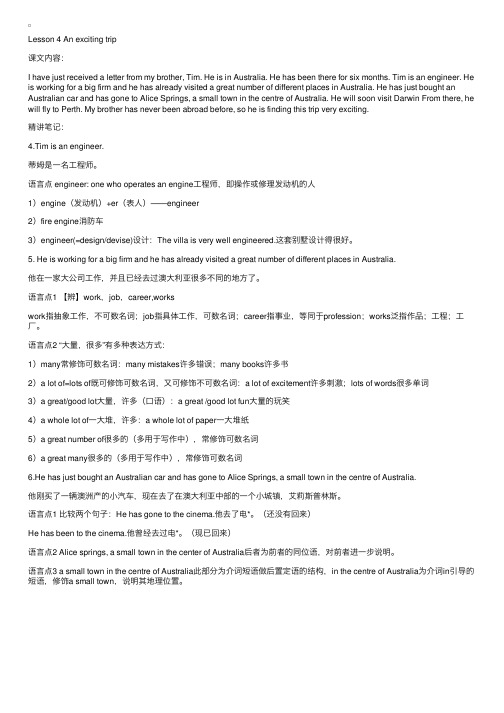
Lesson 4 An exciting trip课⽂内容:I have just received a letter from my brother, Tim. He is in Australia. He has been there for six months. Tim is an engineer. He is working for a big firm and he has already visited a great number of different places in Australia. He has just bought an Australian car and has gone to Alice Springs, a small town in the centre of Australia. He will soon visit Darwin From there, he will fly to Perth. My brother has never been abroad before, so he is finding this trip very exciting.精讲笔记:4.Tim is an engineer.蒂姆是⼀名⼯程师。
语⾔点 engineer: one who operates an engine⼯程师,即操作或修理发动机的⼈1)engine(发动机)+er(表⼈)——engineer2)fire engine消防车3)engineer(=design/devise)设计:The villa is very well engineered.这套别墅设计得很好。
5. He is working for a big firm and he has already visited a great number of different places in Australia.他在⼀家⼤公司⼯作,并且已经去过澳⼤利亚很多不同的地⽅了。
- 1、下载文档前请自行甄别文档内容的完整性,平台不提供额外的编辑、内容补充、找答案等附加服务。
- 2、"仅部分预览"的文档,不可在线预览部分如存在完整性等问题,可反馈申请退款(可完整预览的文档不适用该条件!)。
- 3、如文档侵犯您的权益,请联系客服反馈,我们会尽快为您处理(人工客服工作时间:9:00-18:30)。
Lesson 4 An exciting trip词汇学习1.区分:(1)exciting adj. 令人兴奋的;The news is exciting.这新闻让人兴奋exciting boy 令人兴奋的男孩.(2)excited adj. 兴奋的-ed: 自己感到/ -ing:令人感到I am excited. 我很兴奋(3)excite v. 激动(这类动词的宾语一定是人,让后面的人感到……)The news excited me. 这个消息使我兴奋。
类似用法:interesting adj. 令人感到有趣的;interested adj. 感到有意思的interesting man, The man is interesting.interest v.对……感兴趣The book interests me.那本书让我感到很有趣2. receive v. 接受, 收到vt. 接到,收到,得到When did you receive that letter?你什么时候收到那封信的?receive 是“收到”,指的是一个被动的动作,主观上接受与否不清楚。
receive/have a letter from sb.accept 同意接收This morning I received a bunch of flowers from a boy, but I didn't accept it.今早我收到一束一个男生送的花,但我没有接受区分:take则是主动的“拿”、“取”I received a beautiful pen from my uncle. 我送叔叔那拿了一支漂亮的笔。
My brother took it from me yesterday. 我哥哥昨天从我这拿的。
take 也可以作收到take the exam 接受考试;take advice 接受建议3.firm(1)n. 商行, 公司law firm法律公司(2)adj 结实的,稳固的The car is very firm.区分firm中小型公司;company n. 正规公司;business商行4.a great number of +可数名词复数= a great many +可数名词复数a great number of cars, a great many people区分:a great amount of +不可数名词a great amount of money5.different adj. 不同的① adj. 不同的,相异的(经常与from连用)We are planning something different this year. 我们今年有不同的打算。
My room is different from yours.② adj. 各种各样的,不同的This department store sells a large number of different things.这家百货商店出售许多各种各样的东西。
He has visited many different places in China. 他去过中国的不少地方。
5.abroad adv. 在国外(副词, 直接和动词连用)go abroad 去国外live abroad 国外定居study abroad 国外学习正文:I have just received a letter from my brother, Tim. He is in Australia. Hehas been there for six months. Tim is an engineer. He is working for a big firm and he has already visited a great number of different places in Australia. He has just bought an Australian car and has gone to Alice Springs, a small town in the centre of Australia. He will soon visit Darwin. From there, he will fly to Perth.My brother has never been abroad before, so he is finding this trip very exciting.课文知识点:1.I have just received a letter from my brother, Tim.同位语:一个名词(或短语等)与另一个名词(或短语)并列而作为其说明或限定成分时称为同位语。
同位语与它所补充说明的成分之间用逗号隔开。
在译成汉语时,同位语或者插入主句中,或者另译为一句,很少像英语中那样用逗号隔开。
This is John, one of my best friends. 这位是约翰。
他是我最好的朋友之一。
Mrs. Smith, my neighbore, has never been abroad. 我的邻居史密斯夫人从来没有出过国。
2.He has been there for six months.I have arrived in Beijing. (arrive 是瞬间动词不能和段时间连用)has been + in 地点He has been in Beijing for one year. 他已经在北京呆了一年了。
He has been in America for tow years. 他已经在北京呆了两年了。
3.He is working for a big firm and he has already visited a great number of different places in Australia.work for 在……上班/任职,强调work.I am working for a school. 我在学校上班。
work in 强调地点(在哪个地方上班)I am working in the New Oriental school. 我在新东方上班。
work at 上班She works at a department store. 她在百货商场上班4.He has just bought an Australian car and has gone to Alice springs, a small town in the centre of Australia.has gone to 去了某地没回来has been to 曾经去过某地, 现在不在那个地方5.From there, he will fly to Perth.from there:从那地方起from 既可以加时间又可以加地点from half past 8 to half past 11. from Beijing to Tianjingfrom now/ then on 从现在/那时起fly to Perth = go to Perth by air 6.My brother has never been abroad before, so he is finding this trip very exciting. before 在句子后是副词, 译为“在此之前”,是现在完成时态的标志find作“发现”、“发觉”讲时宾语往往带补足语(一般为形容词),说明宾语的状况、性质等。
find +宾语+形容词做宾补find the room clean find her happy下面表示状态、感觉、情绪、精神活动的动词不可用于进行时:believe,doubt怀疑;不相信;不能肯定,see,hear,know,understand,belong属于,think,consider 考虑,细想,feel,look,seem似乎,show,mind 注意,留意,记住要,have,sound,taste 尝到,感到;体验,require 要求,命令,possess 拥有,持有,care 关心;担心;在乎,like,hate 仇恨,憎恨,love,detest厌恶,憎恶,desire渴望;要求语法知识点:现在完成时:1. 表示一个动作发生在过去但对现在仍然有影响。
常与表不确定时间的状语或表一段时间的时间状语连用。
2. 时间状语:ever(曾)never(未曾)already(已经)yet(仍、还)just (刚刚)lately(最近)before(以前)so far (到目前为止)for + 时间段since + 时间点3. 汉语意思表:已经4.基本结构:主语+have/has+过去分词(done)①肯定句:主语+have/has+过去分词+其他②否定句:主语+have/has+not+过去分词+其他③一般疑问句:Have/Has+主语+过去分词+其他④特殊疑问句:特殊疑问词+一般疑问句(have/has+主语+过去分词+其他)5. 表一段时间的时间状语, 不能和点动词(非延续性)连用.I have lived/been here for four years.He has just retired.He has already retired.Has he retired yet?He hasn’t retired yet.I have bought this book for ten months. (×)I have got this book for ten months.一、延续性动词延续性动词表示的动作不但可以延续,而且可以产生持久的影响。
常见的这类动词有:be,have,keep,know,learn,lie,live,read,sing,sleep,stand,stay,wait,walk,watch等。
二、终止性动词又称为瞬间动词或非延续性动词,它表示的动作不能延续,也就是说动作一旦发生就立即结束,并产生某种结果。
常见的这类动词有:accept,arrive,become,begin,borrow,break,buy,catch,close,come,die,end,fall,finish,get,give,go,join,leave,put,reach,receive,shut,start,stop等。
注意区分一般现在时与现在完成时动作时间一般过去时动作发生在过去,现在已停止。
